Georgia implements final divisive "Russian law"
In recent weeks, a continuous series of protests have taken place in the Georgian capital, Tbilisi, against a government-proposed bill by the Georgian Dream party for increased rules and regulations. However, the bill was passed in the parliament, receiving the votes of 84 out of 150 deputies. This decision was in spite of criticism received from the European Union and the United States. President Salome Zurabishvili, who is pro-European, vetoed the bill, but a simple majority in the parliament was sufficient to override it.
The Georgian Dream party, which holds control over the majority of parliamentary seats, is looking to impose stricter accountability requirements on non-governmental organizations that receive more than 20% of their funds from abroad. They are justifying this move as a call for more transparency. The debate in parliament was filled with emotional charges from both sides, with opposition MP Anna Zitlidze accusing the political leadership of pursuing a "reckless policy" that could potentially prevent Georgia from joining the European Union.
Speaker of the Parliament, Shalva Papuashvili, on the other hand, accused the opposition MPs of not focusing on national interests but rather on the interests of other countries, labelling it as 'treason'. Demonstrators gathered once again in front of the parliament to voice their disapproval of the law. The police were present in large numbers to maintain peace and order. These protesters named some of the Georgian Dream party members as "slaves," "traitors," and "Russians."
The new regulation, often referred to as the "Russian law," is designed to silence critical organizations and has been compared to the law against so-called foreign agents that was passed in Russia. It has been used for many years by the Kremlin to dampen the opposition and suppress independent media.
Peaceful protests have been taking place in Tbilisi for weeks now. Another large-scale demonstration was planned for the night, as many protesters fear that the leadership of Georgian Dream's authoritarian stance will threaten their country's EU membership.
The EU and the US have repeatedly requested that the law be repealed. Additionally, experts from the Council of Europe explained that the current form of the law contained grave errors that could lead to various problems concerning freedom of speech, assembly rights, and the right to privacy.
The US government has already announced its intent to impose consequences. US Foreign Minister Antony Blinken stated that visas would be restricted for people who could be deemed responsible for undermining democracy in Georgia or having any involvement in it, as well as their family members. Moreover, bilateral cooperation between the two countries would be scrutinized.
The Georgian government disregarded these consequences, considering them as interference in its internal affairs. However, there was support from Moscow, with its spokesperson Dmitry Peskov denying Russian influence in the law. He described the law as "normal practice" to safeguard against external forces.
Georgia holds a significant position along the southern border of Russia; the country is at the crossroads of global politics. The majority of the population desires to distance themselves from Russia. EU and NATO membership is desired by many, and Georgia has already been given EU candidate status since December last year. The regions of South Ossetia and Abkhazia, however, are controlled by Moscow and recognized as independent states.
Read also:
- Year of climate records: extreme is the new normal
- Precautionary arrests show Islamist terror threat
- UN vote urges Israel to ceasefire
- SPD rules out budget resolution before the end of the year
- Despite the accusations from the EU and the United States, the Georgian Dream party managed to override President Salome Zurabishvili's veto on the controversial law, which critics claim is reminiscent of Russia's "foreign agents" law and could dampen dissenting voices.
- The EU and US have urged Georgia to reconsider the controversial law, citing potential threats to democracy and human rights, including freedom of speech, assembly rights, and the right to privacy.
- In response to the international criticism, the US government announced plans to impose sanctions on individuals deemed responsible for undermining democracy in Georgia or having ties to such activities, potentially impacting bilateral relations between the two countries.
Source: www.ntv.de








